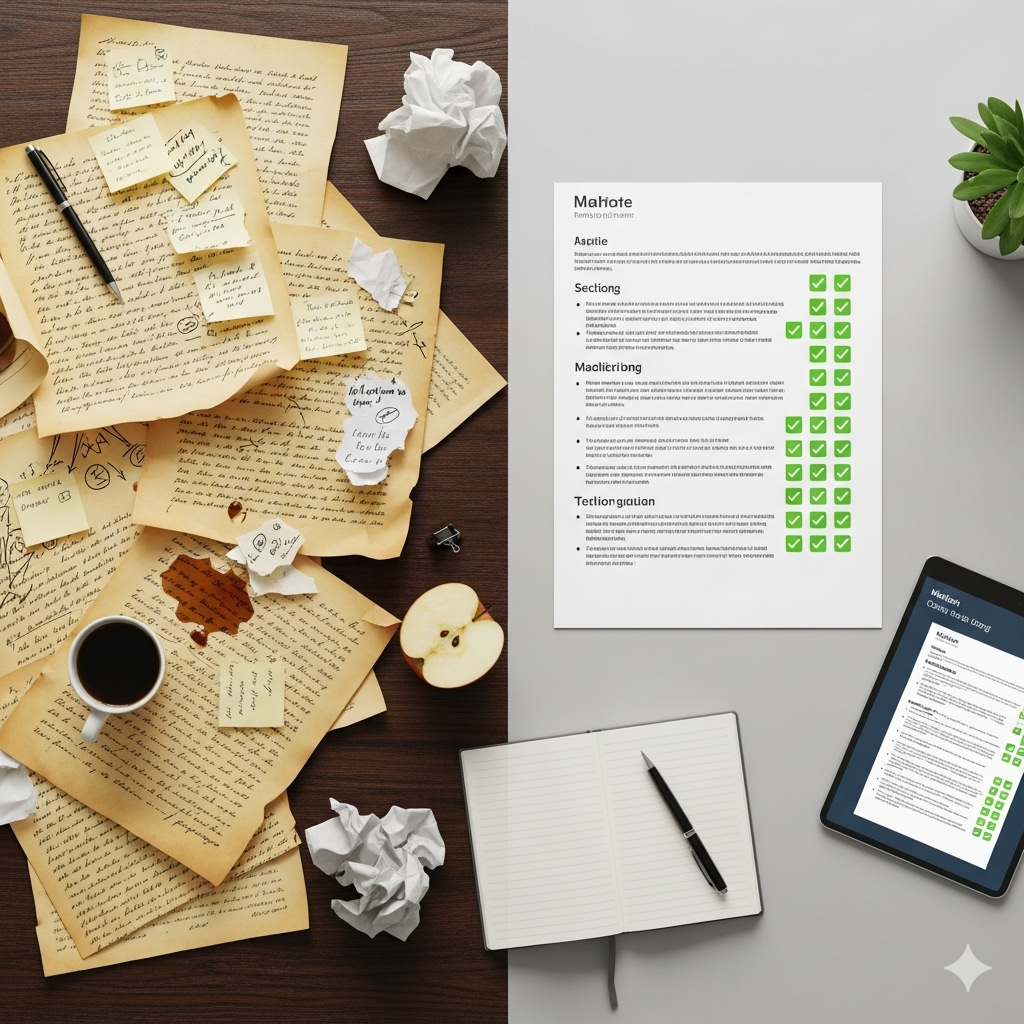Affordable AI manuscript review for non-fiction authors—fix structural flaws, unclear arguments, repetition and readability issues. Get professional feedback under $50 with clarity, structure and flow improved in 24 hours.

Table of Contents
For non-fiction authors, the journey from first draft to polished manuscript can feel overwhelming. Structural flaws, unclear arguments, repetitive content, and readability issues often stand in the way of turning a good draft into a great book. Traditionally, fixing these problems required expensive developmental editors and weeks of waiting. But today, thanks to AI manuscript review tools, authors can now access fast, objective, and highly effective feedback at a fraction of the cost. Imagine receiving a real AI editing result for under $50—an affordable manuscript review that highlights structural gaps, strengthens arguments, eliminates repetition, and improves clarity within 24 hours. My author experience with AI editor technology revealed just how transformative this process can be, offering professional-level insights that empower writers to elevate their manuscripts with confidence.

As a non-fiction author, I know the drill: countless hours of research, meticulous outlining, and the arduous process of drafting. My latest manuscript—a deep dive into sustainable urban development—felt like my magnum opus. But after hitting save on the final draft, a familiar dread crept in. I knew it needed more than a proofread. It needed a serious overhaul: someone (or something) to spot the structural flaws, unclear arguments, and repetitive content I could no longer see.
The problem? My budget was tight, and my deadline tighter. Hiring a professional editor meant thousands of dollars and weeks I didn’t have. I needed a faster, smarter manuscript review process, something that could deliver a real AI editing result—objective, affordable, and effective.
I’d heard whispers about AI in publishing, but was skeptical. Could an ai manuscript checker or ai manuscript analysis tool really handle the demands of a complex non-fiction manuscript format? Could a book review ai tool go beyond grammar and actually improve clarity, structure, and readability?
Desperate, I tried Manuscript AI—a platform built for non-fiction authors. To my surprise, it went far beyond spell-checking. It analyzed chapter flow, strengthened arguments, flagged repetition and even improved pacing. And it did all this in less than 24 hours.
What I received was more than feedback—it was a roadmap. An affordable manuscript review that cut weeks off my timeline and gave me confidence to keep pushing forward. For writers navigating self publishing a book, this kind of AI support isn’t just convenient—it’s empowering.
Before I discovered the power of AI manuscript review testimonial, my non-fiction book felt like a jigsaw puzzle with a few missing pieces and some incorrectly placed ones. I thought I was done, but deep down, I knew it wasn't quite there. The core arguments were solid, I believed, but the flow felt off, and some sections felt redundant, common issues for any first-time author.

Here were my main concerns:
I knew a human developmental editor would cost thousands and take weeks, time I simply didn't have. This is where my search for an affordable manuscript review led me down a new path.
I was scrolling through author forums, desperate for a solution that matched both my budget and my timeline, when I noticed several threads about AI-powered manuscript reviews. At first, I dismissed them as nothing more than glorified grammar checkers. After all, most tools I’d seen barely scratched the surface—fixing typos without addressing the deeper issues every non-fiction manuscript format struggles with: structure, clarity, and flow.
But then one recommendation caught my attention: Manuscript AI. Unlike the usual tools, it was specifically designed for non-fiction authors, and what really made me pause was the price—an affordable $49 review fee. An AI review for under $50 covering a full manuscript? It felt almost unbelievable, especially compared to the steep costs of traditional editing.
Curiosity outweighed my skepticism, so I visited their site. What impressed me wasn’t just the price—it was their transparency. They explained exactly what their AI analyzed: not only grammar and spelling, but also structural coherence, argument strength, pacing, clarity, and overall engagement. In other words, this wasn’t just an ai manuscript checker—it was closer to a developmental-level AI manuscript analysis. For a time-pressed writer like me, this sounded like the perfect shortcut in the manuscript review process.
The idea of getting a real AI editing result that could quickly highlight structural weaknesses, redundant content, and areas needing more context was too appealing to ignore. With equal parts doubt and hope, I uploaded my manuscript, paid the fee and clicked analyze. Honestly, I half-expected a generic report—but what I was about to receive was far more than I imagined.
Within minutes, Manuscript AI delivered a comprehensive report. I braced myself for a scathing critique, but what I received was a highly organized, objective, and actionable analysis that truly felt like a breakthrough. This was my real AI editing result. It was incredibly thorough, resembling the depth of initial feedback a human developmental editor would provide, but delivered at unparalleled speed and cost.
Here's what the report immediately highlighted:

I spent the next 24 hours (with a few breaks, of course!) diligently going through the report. The beauty of the AI's feedback was its clarity and the fact that it wasn't overwhelming. Each suggestion was specific, allowing me to make precise revisions without guessing. This author experience with AI editor was intuitive and empowering.
My author experience with AI editor solutions, particularly with Manuscript AI, vastly exceeded my expectations. I had anticipated minor tweaks, but I received a deep dive into the very architecture of my non-fiction book. The immediate, actionable feedback allowed me to tackle major revisions with confidence.
Here are the key takeaways from my journey:
This truly was a real AI editing result that transformed my draft into a much stronger, more coherent, and engaging non-fiction work.
My experience with Manuscript AI has convinced me that tools such as an ai manuscript checker or ai manuscript analysis platform are not just passing fads—they are becoming a cornerstone of the future of publishing, particularly for independent authors. While these tools don’t replace the creativity, intuition, and subjective judgment that only a human editor can bring, they function as an indispensable co-pilot in the manuscript review process, handling the heavy lifting of structure, clarity, pacing, and readability analysis.
For non-fiction authors, whose work depends on logical flow, strong argumentation, and precise language, AI is an especially powerful fit. Unlike traditional spell-checkers, these advanced systems can identify patterns, inconsistencies, repetitive content, and unclear passages that weaken a manuscript’s impact. They provide a real AI editing result that helps authors eliminate flaws early, freeing up more time for refining insights, strengthening arguments, and connecting with readers.
The value here is not just speed—it’s accessibility. The rise of the affordable manuscript review means professional-level feedback is no longer reserved for authors with large budgets. Whether you’re a first-time author or a seasoned writer preparing for self publishing a book, AI editing tools democratize access to insights that once cost hundreds or even thousands of dollars.
I believe the future of editing will be a partnership: AI tools acting as the first line of analysis, supported by human editors for final nuance and polish. Together, they create a workflow that is faster, more affordable, and ultimately more empowering for writers. For anyone serious about producing high-quality non-fiction, exploring these affordable editing tools is no longer optional-it’s essential.

If you’re a first-time author, or any non-fiction writer staring down a manuscript that desperately needs polish but dreading the high cost and slow pace of traditional editing, I strongly encourage you to explore an ai manuscript checker like Manuscript AI. Unlike basic grammar tools, it delivers a true AI manuscript analysis—pinpointing structural gaps, clarifying arguments, highlighting repetition, and streamlining readability. My own author experience with AI editor technology was eye-opening, transforming what could have been weeks of frustrating revisions into a single, highly productive 24 hours.
This isn’t just about saving money or time—it’s about empowerment. The right manuscript review process can give you the confidence that your book is ready to connect with readers. With a real AI editing result, you get actionable, objective feedback that makes your non-fiction manuscript tighter, clearer, and more engaging. And the best part? It comes as an affordable manuscript review—just $49 for insights that rival developmental editing.
For writers navigating the challenges of self publishing a book, or for anyone seeking a reliable alternative to expensive editing services, tools like book review ai tools are game-changers. They give you the ability to refine your draft on your own terms, without compromising on quality.
Don’t let editing overwhelm you or stall your publishing dreams. Harness the power of AI to produce your best work. Get a real AI editing result for your non-fiction manuscript today and take that confident step toward publishing your masterpiece. Visit Manuscript AI now and experience the future of editing for yourself.

Co-founder of Manuscript AI | Writing Afficianado